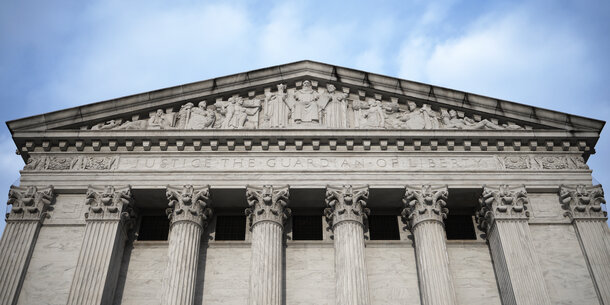Yesterday the Ohio Supreme Court denied a motion filed by petitioners in Ohio Organizing Collaborative v. Ohio Redistricting Commission to consider objections to the legislative maps adopted by the Ohio Redistricting Commission in September and dismissed the case. The court wrote that, because the most recent maps were approved by the commission across party lines, the circumstances surrounding these maps were different than when the court had allowed a similar challenge to go forward over maps the commission had adopted in September 2021. Regardless of the bipartisan vote, the new maps, like the September 2021 maps, give one party an advantage that, according to the petitioners, is “nearly identical” to the one in the maps adopted in 2021. The court had struck down the 2021 maps as unconstitutional gerrymanders.
In Ohio Organizing Collaborative v. Ohio Redistricting Commission, the Brennan Center for Justice at NYU Law and Reed Smith represent petitioners Ohio Organizing Collaborative, CAIR-Ohio, Ohio Environmental Council, Ahmad Aboukar, Crystal Bryant, Samuel Gresham Jr., Prentiss Haney, and Pierrette “Petee” Talley. Please attribute the following quotes as noted.
“Yesterday the Ohio Supreme Court let a redistricting process run by politicians stand against the voters of Ohio and the state constitution. District lines that divide up Black and Brown communities will continue to keep fair representation out of reach. The process is the problem, and we will change it, putting citizens in charge of map-drawing, not the politicians whose futures depend on it.” — Jeniece L. Brock, Policy & Advocacy Director, Ohio Organizing Collaborative
“The Ohio Supreme Court’s dismissal of our case hurts. Ohioans of color must continue to wait for fair representation in state government. We’ve had to rely on a redistricting process that puts elected officials in charge. We need citizen-led redistricting that’s independent of politicians’ concerns and driven by the people’s rights.” — Pierrette “Petee” Talley, petitioner and Executive Director, Ohio Unity Coalition
“The Ohio Supreme Court has closed its door on us, but we will not be silenced. These maps ensure that Ohio’s Muslim communities will continue to be overlooked and marginalized in Columbus. We will continue to work toward reform that takes the job of map-drawing away from the politicians and gives it to the citizens.” — Amina Barhumi, Executive Director, CAIR-Ohio
“The Ohio Supreme Court’s decision sidesteps one of its core responsibilities: providing a check against overreach by a political branch of government. No matter which commissioners voted for the September 2023 maps, the districts do not correspond to the preferences of Ohio voters and carve up the state’s communities for partisan advantage. The ruling is yet another reminder that the only path to protecting the interests of citizens and not politicians is through citizen-led reform.” — Yurij Rudensky, Senior Counsel in the Democracy Program, Brennan Center for Justice at NYU Law
Resources:
- “Petitioners Ask Ohio Supreme Court to Reject Latest Legislative Maps for Illegal Partisan Gerrymandering,” Brennan Center press release, Oct. 5, 2023
- “Ohio Proves Politicians Can’t Be Trusted to Draw Voting Maps” by Yurij Rudensky and Gabriella Sanchez, Brennan Center for Justice
- “Ohio Redistricting Commission Passes Partisan Gerrymandered Maps that Violate State Constitution, Deny Ohioans Fair Representation,” Brennan Center press release, Sept. 27, 2023
- “Ohio Republicans Steamrolling over Fundamental Voting Rights to Suppress Black Voices” by Jeniece Brock, policy and advocacy director, Ohio Organizing Collaborative, The Columbus Dispatch
- “Plaintiff: Just like Jim Crow, commission 'robbing’ Black Ohioans of 'political power" by Sam Gresham, petitioner and chair of Common Cause Ohio, The Columbus Dispatch
- “COVID Inequities Show Why Ohio’s Fair Map Mandate Must Not Be Ignored” by Jeniece Brock, policy and advocacy director, Ohio Organizing Collaborative, Cleveland Plain Dealer
- “Ohio Take Note: Fairness Is a Universal Value” by Tala Dahbour, policy director, CAIR-Ohio
- “How Gerrymandering Contributes to Environmental Injustice” by Callia Téllez, environmental policy fellow, Ohio Environmental Council




